本试题 “短文改错下面短文中有10处语法错误。请在有错误的地方增加、删除或修改某个单词。增加:在缺词处加一个漏字符号(∧),并在其下面写上该加的词。删除:把多余...” 主要考查您对关系代词
形容词的比较级
形容词
副词
介词和介词短语
动词
虚拟语气
等考点的理解。关于这些考点您可以点击下面的选项卡查看详细档案。
- 关系代词
- 形容词的比较级
- 形容词
- 副词
- 介词和介词短语
- 动词
- 虚拟语气
关系代词的概念:
英语中的关系代词有who, whom, whose, that, which, 它们是用来引导定语从句的。关系代词既代表定语从句所修饰的词,又在其所引导的从句中承担一个成分,如主语、宾语、表语、或定语。
如:This is the man who saved your son. (who在从句中作主语,先行词是man)
The man whom I met yesterday is Jim.
A child whose parents are dead is an orphan.
He wants a room whose window looks out over the sea.
关系代词用法:
1、that与which的用法区别:
两者都可指物,常可互换。其区别主要在于:
(1)引导非限制性定语从句时,通常要用which:
如:She received an invitation from her boss, which came as a surprise. 她收到了老板的邀请,这是她意想不到的。
(2)直接放在介词后作宾语时,通常要用which:
如:The tool with which he is working is called a hammer. 他干活用的那个工具叫做锤子。
(3)当先行词是下列不定代词或被它们修饰时much, little, none, all, few, every(thing), any(thing), no(thing)等时,通常用that:
如:There was little that the enemy could do but surrender. 敌人无法,只有投降了。
All[Everything] that can be done must be done. 凡能做的事都必须做。
(4)当先行词有the very, the only, the same等修饰时,通常用that:
如:This is the only example that I know. 我知道的例子只有这一个。
Those are the very words that he used. 那是他的原话。
(5)当先行词有形容词最高级或序数词(包括last, next等)等修饰时,通常用that:
如:This is the best dictionary that I've ever used. 这是我用过的最好的词典。
The first thing that you should do is to work out a plan. 你应该做的第一件事是订个计划。
(6)当关系代词在定语从句中用作表语时,通常用that:
如:China is not the country(that) it was. 中国已不是过去的中国了。
(7)当先行词是一个既指人又指物的并列词组时,通常用that:
如:They talked about the persons and things that most impressed them. 他们谈论了使他们印象最深的人和事。
(8)当要避免重复时:
如:Which is the course that we are to take? 我们选哪门课程?
2、that与who的用法区别:
(1)两者均可指人,有时可互换:
如:All that[who] heard him were delighted. 所有听了他讲话的人都很高兴。
Have you met anybody that[who] has been to Paris? 你遇见过到过巴黎的人吗?
He is the only one among us that[who] knows Russian. 他是我们中间唯一懂俄语的人。
(2)但是在下列情况,通常要用that:
①当先行词是一个既指人又指物的并列词组时:
如:I made a speech on the men and things that I had seen abroad. 我就我在国外所见到的人和事作了报告。
②当先行词是who时(为避免重复):
如:Who was it that won the World Cup in1982? 谁赢得了1982年的世界杯?
③当关系代词在定语从句中作表语时(可省略):
如:Tom is not the boy(that) he was. 汤姆这孩子已不是以前那个样子了。
关系代词知识体系:
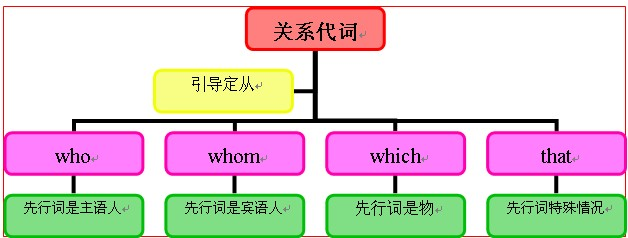
关系代词用法拓展:
1、as与which的用法区别:
(1)引导限制性定语从句时,在such,as,thesame后只能用as,其他情况用which:
如:I never heard such stories as he tells. 我从未听过他讲那样的故事。
It's the same story as I heard yesterday. 这故事跟我昨天听到的一样。
This is the photo which shows my house. 这张照片拍的是我的住宅。
(2)引导非限制性定语从句时,有时两者可互换:
如:I live a long way from work, as [which] you know. 我住得离工作单位很远,这你是知道的。
(3)但在,在以下情况引导非限制性定语从句时,两者不可换用:
①当从句位于主句前面时,只用as:
如:As is known to everybody, the moon travels round the earth once every month. 月球每月绕地球转一周,这是每个人都清楚的。
②as引导的非限制性定语从句应与主句在意义上和谐一致,which无此限制:
如:He went abroad, as[which] was expected. 他出国了,这是大家预料到的。
He went abroad, which was unexpected. 他出国了,这让大家感到很意外。(不用as)
③as引导非限制性定语从句时,先行词通常不能是主句中某个具体的词,而应是整个句子、整个短语或某个短语推断出来的概念,而which则无此限制:
如:The river, which flows through London, is called the Thames. 这条流经伦敦的河叫泰晤士河。(不用as)
④当as引导非限制性定语从句作主语时,其谓语通常应是连系动词,而不宜是其他动词,而which则无此限制:
如:She has married again, as[which] seemed natural. 她又结婚了,这似乎很自常。
She has married again, which delighted us.她又结婚了,这使我们很高兴。(不用as)
2、who与whom的用法区别:
两者均只用于人,从理论上说,who为主格,whom为宾格:
如:Where's the girl who sells the tickets? 卖票的女孩在哪里?
The author whom you criticized in your view has written a letter in reply. 你在评论中批评的那个作者已写了一封回信。
但实际上,除非在正式文体中,宾格关系代词whom往往省略不用,或用who或that代之:
如:The man(that, who, whom) you met just now is called Jim. 你刚遇见的那个人叫吉姆。
不过,在以下几种情况值得注意:
(1)直接跟在介词后面作宾语时,只能用whom,而且不能省略:
如:She brought with her three friends, none of whom I had ever met before. 她带了3个朋友来,我以前都没见过。
(2)引导非限制性定语从句且作宾语时,who和whom均可用,但以用whom为佳,此时也不能省略:
如:This is Jack, who[whom] you haven't met before. 这是杰克,你以前没见过。
形容词比较级概念:
大多数形容词(性质形容词)有比较级,用来表示两个人或事物之间的比较“较……”。
如:I am taller than you.
形容词比较级特殊用法:
1、没有比较对象的比较结构:
所谓没有比较对象的比较结构不是指省略而言,而是指并非真正的比较。
例如:The car runs faster than110 miles. 那辆车时速为110多英里。
There is more than one solution to the problem. 这个问题的解决办法不止一个。
The daily cost in an average hospital in the United States can run as high as $250. 在美国普通医院的每天的费用可高达250美元。
2、用比较级的形式表达最高级的意思:
在这种情况下,往往是将一个人或是一件事与其他所有的人或事相比较。注意别忘了常在比较状语中用any, other, else类的字眼,以将比较主体排除在比较对象以外,因为自己不可以与自己相比较。
例如:He is taller than any one else in our class. 他在我们班比其他任何都高。
Iron is more useful than any other metals. 铁比其他任何金属更有作用。
3、no+比较级+than的结构表示“A和B一样不……”:
例如:She runs no faster than her sister.她与她妹妹一样跑不快。
Tom is no wiser than John. 汤姆和约翰一样没有聪明才智。
He is no richer than his brother. 他与他弟弟一样不富有。
4、汉语可以说“昆明的气候比兰州好”。英语必须加that:
例如:The climate of Kunming is better than that of Lanzhou.
5、英语比较级常译作“较…”、“…一些”等,但不等于汉语的“更…”。汉语的“更…”须用“still”或“even”来表示:
如:This book is even more difficult than that one. 这本书比那本书更难。
6、有些情况下,汉语不用“较”等字眼,英语则须用比较级:
如:Will the younger people give their seats to old people? 请年轻人把座位让给老年人好不好?
形容词比较级的用法:
1、比较级用于二者的比较,其结构是:含有形容词比较级的主句+从属连词than引导的从句(从句中常省去意义上和主句相同的部分)。
如:Li is older than Zhou. 李比周年纪大。(从句中省去了is old)
There are more children in this nursey than in that one. 这个托儿所的孩子比那个托儿所多。(从句中省去了there are children)
After two years' physical training, she is healthier and stronger. 经过两年的体力锻炼,她(比以前)健康强壮多了。(注意这里省去了从句than she was)
We are much better off than ever before. 我们的生活比过去任何时候都要好得多。(than后省去了we were)
Paul weighs less than harry. 保尔的体重比哈利轻。
Mary is less clever than Jane. 玛丽不如简那么聪明。
2、可修饰比较级的词:
1)a bit, a little, rather, much, far, by far, many, a lot, lots, a great deal, any, still, even等
2)还可以用表示倍数的词或度量名词作修饰语。
3)以上词(除by far)外,必须置于比较级形容词或副词的前面。
典型例题:
1)—Are you feeling ____?
—Yes,I'm fine now.
A. any well
B. any better
C. quite good
D. quite better
答案:B. any可修饰比较级,quite修饰原级,well的比较级为better.
2)The experiment was____easier than we had expected.
A. more
B. muchmore
C. much
D. moremuch
答案:C. much可修饰比较级,因此B,C都说得通,但easier本身已是比较级,不需more,因此C为正确答案。
3)If there were no examinations, we should have___at school.
A. the happiest time
B. a more happier time
C. much happiest time
D. a much happier time
答案:D.
注:many, old和far用法:
1)如果后接名词时,much more+不可数名词 many more+可数名词复数
2)old有两种比较级和最高级形式:older/oldest和elder/eldest。elder,eldest只用于兄弟姐妹的长幼关系。
如:My elder brother is an engineer.
3)far有两种比较级,farther,further在英语中两者都可指距离。在美语中,father表示距离,further表示进一步。
如:I have nothing further to say.
3、比较级中的两个特殊作用的结构:
1)The+比较级+句子,表示的意义是“越(怎么样就)越(怎么样)”,在这个结构中的两个“比较级”不要求一定词性相同,它们各自的词性要依句子的需要而定;
2)和比较级+and+比较级。表示的意义是“越来越(怎么样)”,在这个结构中的两个“比较级”则要求词性相同。
例如:The harder you work at your study, the better academicrecords you will have. 你学习越努力,你的成绩就越好。
The more we have, the more we want. 人欲无穷。
When winter is coming, it gets colder and colder. 冬天来临之际,天越来越冷了。
He became less and less satisfied with the foot ball team's performance. 他对足球队的表现越来越不满意了。
形容词比较等级知识体系:
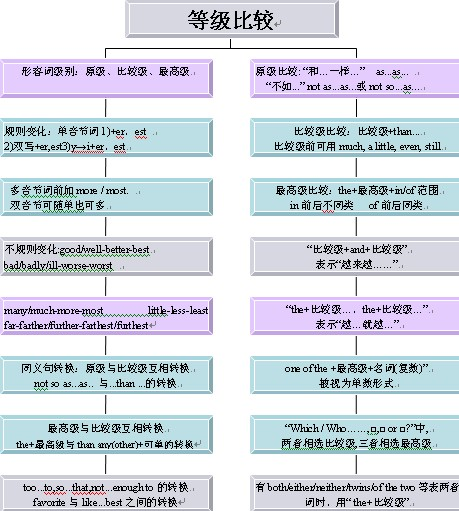
特殊形容词比较级变化:
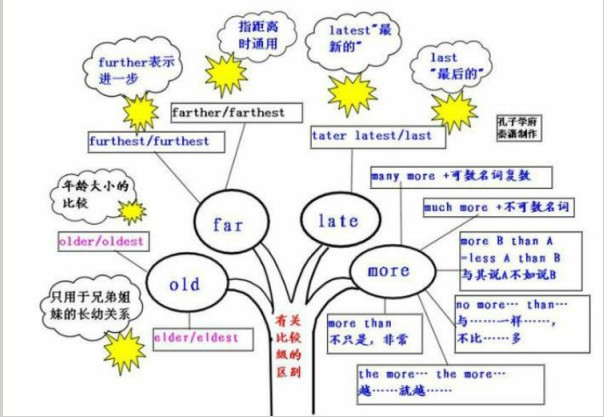
形容词的概念:
形容词(adjective),简称adj.或a,形容词用来修饰名词或代词,表示人或事物的性质、状态,和特征的程度好坏与否,形容词在句中作定语、表语、宾语补足语。通常,可将形容词分成性质形容词和叙述形容词两类,其位置不一定都放在名词前面。
形容词的作用与位置:
形容词是用来修饰名词的,常被放在名词前作定语,或放在系动词后面作表语。以下属几种特殊情况,须牢记;
(1)形容词短语作定语,定语后置。
如:a language difficult to master,
a leaning tower about 180 feet high
(2)表语形容词(afraid、alike、alone、asleep、awake、alive等)作定语,定语后置。如a man alive。有些表身体健康状况的形容词如well、faint、ill只作表语。sick既可作表语又可作定语,ill如作定语意为“bad”。
(3)用作定语,修饰由不定代词one、no、any、some和every构成的复合词如anything、something等时,通常后置。
如:I have something important to tell you.
(4)else常用作疑问代词和不定代词的后置定语。
(5)enough、nearby修饰名词前置或后置,程度副词一般位于形容词、副词前面,enough修饰形容词、副词时,必须后置。
(6)几个并列的形容词作定语,其语序通常为:限定语(The、A)+描绘性形容词+size(大小)+shape(形状)+age(年龄、时间)+color(颜色)+origin(国籍、来源)+material(材料)+purpose(目的)+名词。
口诀:
限定描绘大长高,形状年龄和新老;颜色国籍跟材料,作用类别往后靠。
如:a heavy black Chinese steel umbrella,
the man's first tow interesting little red French oil paintings
形容词的用法:
1、形容词修饰名词,说明事物或人的性质或特征。通常,可将形容词分成性质形容词和叙述形容词两类,其位置不一定都放在名词前面:
1)直接说明事物的性质或特征的形容词是性质形容词,它有级的变化,可以用程度副词修饰,在句中可作定语、表语和补语。例如:hot热的。
2)叙述形容词只能作表语,所以又称为表语形容词。这类形容词没有级的变化,也不可用程度副词修饰。
大多数以a开头的形容词都属于这一类。例如:
afraid害怕的。(错)Heisanillman. (对)Themanisill. (错)Sheisanafraidgirl. (对)Thegirlisafraid.
这类词还有:well,unwell,ill,faint,afraid,alike,alive,alone,asleep,awake等。
3)形容词作定语修饰名词时,要放在名词的前边。但是如果形容词修饰以-thing为字尾的词语时,要放在这些词之后。例如:somethingnice
2、用形容词表示类别和整体:
1)某些形容词加上定冠词可以泛指一类人,与谓语动词的复数连接。如:the dead,the living,the rich,the poor,the blind,the hungry The poorarelosinghope.穷人失去了希望。
2)有关国家和民族的形容词加上定冠词指这个民族的整体,与动词的复数连用。如:the British,the English,the French,the Chinese. The English have wonderful senseofhumor.
以-ly结尾的形容词:
1)大部分形容词加-ly可构成副词。但friendly,deadly,lovely,lonely,likely,lively,ugly,brotherly,仍为形容词。改错:
如:(错)She sang lovely.
(错)He spoke to me very friendly.
(对)Her singing was lovely.
(对)He spoke to me in a very friendly way.
2)有些以-ly结尾既为形容词,也为副词。 daily,weekly,monthly,yearly,early .
如:The Times is a daily paper.
The Times is published daily.
形容词知识体系:
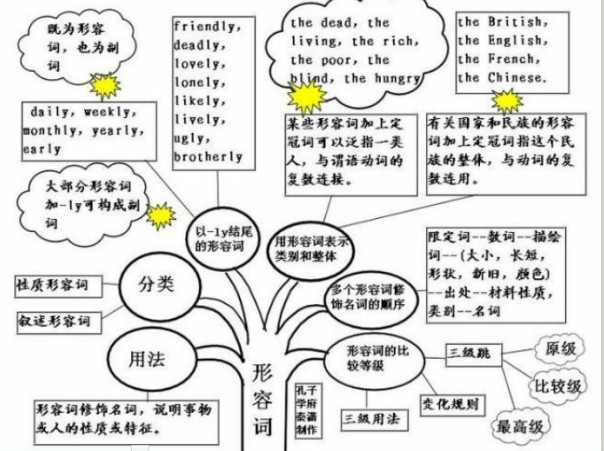
复合形容词的构成:
(1)形容词+名词+ed:
如:kind-hearted 好心的,white-haired 白发的
(2)形容词+形容词:
如:red-hot 炽热的,dark-blue 深蓝的
(3)形容词+现在分词:
如:good-looking 好看的,easy-going 随和的
(4)副词+现在分词:
如:hard-working 勤劳的,fast-moving 快速转动的
(5)副词+过去分词:
如:hard-won 得来不易的,newly-made 新建的
(6)名词+形容词:
如:life-long 终生的,world-famous 世界闻名的
(7)名词+现在分词:
如:peace-loving 爱好和平的,fun-loving 爱开玩笑的
(8)名词+过去分词:
如:snow-covered 白雪覆盖的,hand-made 手工的
(9)数词+名词+ed:
如:four-storeyed 4层楼的,three-legged 3条腿的
(10)数词+名词(名词用单数):
如:ten-year 10年的, two-man 两人的
副词的概念:
副词是指在句子中表示行为或状态特征的词,用来修饰动词、形容词、其他副词、介词短语、非谓语动词乃至整个句子,表示时间、地点、程度、方式等概念。
副词的位置:
1)在动词之前。
2)在be动词、助动词之后。
3)多个助动词时,副词一般放在第一个助动词后。
注意:
a. 大多数方式副词位于句尾,但宾语过长,副词可以提前,以使句子平衡。
如:We could see very clearly a strange light ahead of us.
b. 方式副词well,badly糟、坏,hard等只放在句尾。
如:He speaks English well.
副词的排列顺序:
1)时间,地点副词,小单位的在前,大单位在后。
2)方式副词,短的在前,长的在后,并用and或but等连词连接。
如:Please write slowly and carefully.
3)多个不同副词排列:程度+地点+方式+时间副词。
注意:副词very可以修饰形容词,但不能修饰动词。
改错:(错)I very like English.
(对)I like English very much.
注意:副词enough要放在形容词的后面,形容词enough放在名词前后都可。
如:I don't know him well enough.
There is enough food for everyone to eat.
There is food enough for everyone to eat.
兼有两种形式的副词:
1)close与closely:
close意思是“近”;closely意思是“仔细地”。
如: He is sitting close to me.
Watch him closely.
2)late与lately:
late意思是"晚";lately意思是“最近” 。
如:You have come too late.
What have you been doing lately?
3)deep与deeply:
deep意思是“深”,表示空间深度;deeply时常表示感情上的深度,“深深地” 。
如:He pushed the stick deep into the mud.
Even father was deeply moved by the film.
4)high与highly:
high表示空间高度;highly表示程度,相当于much。
如:The plane was flying high.
I think highly of your opinion.
5)wide与widely:
wide表示空间宽度;widely意思是“广泛地”,“在许多地方”。
如:He opened the door wide.
English is widely used in the world.
6)free与freely:
free的意思是“免费”;freely的意思是“无限制地”。
如:You can eat free in my restaurant whenever you like.
You may speak freely, say what you like.
副词知识体系:
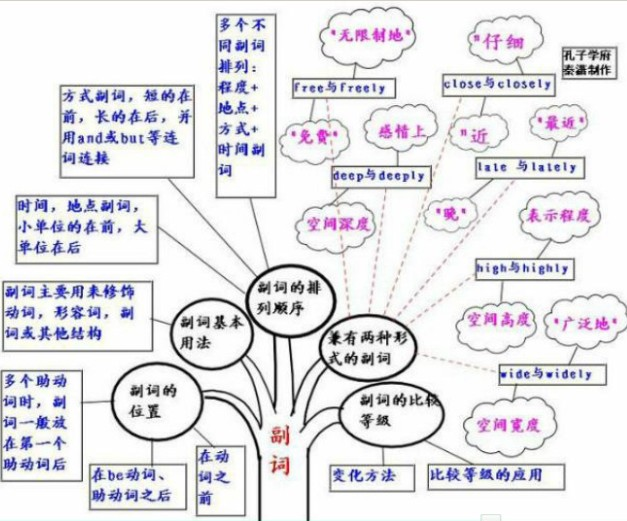
介词和介词短语的概念:
介词是一种用来表示词与词、词与句之间的关系的虚词,在句中不能单独作句子成分。介词后面一般有名词、代词或相当于名词的其他词类,短语或从句作它的宾语。介词和它的宾语构成介词词组,在句中作状语,表语,补语或介词宾语。介词可以分为时间介词、地点介词、方式介词和其他介词。
误用介词的三种情况:
1、多用介词:
多用介词可能是受汉语意思的影响将及物动词误用作不及物动词,也可能是受相关结构的影响而用错:
误:We discussed about the plan.
正:We discussed the plan. 我们讨论了计划。
误:Did he mention about the accident?
正:Did he mention the accident? 他提到那次事故了吗?
误:I saw her enter into the bank.
正:I saw her enter the bank. 我看见她进了银行。
误:He married with[to] a nurse.
正:He married a nurse. 他同一位护士结了婚。
误:How can contact with you?
正:How can contact you? 我怎么与你联系?
误:We should serve for the people heart and soul.
正:We should serve the people heart and soul. 我们应该全心全意地为人民服务。
误:Who controls over the factory? (但名词control可接over)
正:Who controls the factory? 谁管理这个工厂?
误:He has a great many of friends here. (比较a great number of)
正:He has a great many friends here. 他在这儿有很多朋友。
2、漏用介词:
漏用介词可能是受汉语意思的影响将不及物动词误用作及物动词,或是受相关结构的影响的影响而用错等:
误:This matter is difficult to deal. (deal with=处理)
正:This matter is difficult to deal with. 这事很难处理。
误:He is not a man to be depended.
正:He is not a man to be depended on. 他不是个可靠的人。
误:He took a cup of tea, and went on the story.
正:He took a cup of tea, and wentonwiththestory.他喝了一口茶,又接着讲故事。
误:My mother still regards me a child. (比较consider…as中的as可省略)
正:My mother still regards me as a child. 我母亲还把我当小孩看。
误:They insisted sending a car over to fetch us.
正:They insisted on sending a car over to fetch us.他们坚持要派车来接我们。
误:What he says is worth listening.
正:What he said is worth listening to.他的话值得一听。
3、错用介词:
错用介词的情况比较复杂,可能是因受汉语意思的而错,也可能是因弄不清搭配关系而错,可能是混淆用法而错,也可能是受相关结构的影响而错,可能是忽略语境而错,也可能是想当然的用错:
误:She called on his office yesterday. (call on+人,call at+地点)
正:She called at his office yesterday. 她昨天去了他办公室拜访。
误:He is engaged with a nurse.
正:He is engaged to a nurse.他与一位护士订了婚。
误:The sun rises from the east.
正:The sun rises in the east.太阳从东方升起。
误:Under his help, I finished it in time.
正:With his help, I finished it in time. 在他的帮助下,我及时做完了。
误:During he was in Japan, he visited many places.
正:During his stay in Japan, he visited many places.他在日本期间,参观过许多地方。
误:We are familiar to his character.
正:We are familiar with his character.我们了解他的性格。
误:Help yourself with the fruit.
正:Help yourself to the fruit.吃点水果吧。
介词的宾语:
1、名词或代词作介词宾语:
如:Are you interested in history? 你对历史感兴趣吗?
Don't worry about it. 别为它担心。
注:若是人称代词用作介词宾语,要注意用宾格。
如:No one can sing like her. 没有人能像她那样唱歌。(不能用like she)
2、动名词作介词宾语:
如:He is good at telling stories. 他善于讲故事。
In crossing the street he was run over. 他在穿过马路时被汽车撞倒。
3、过去分词作介词宾语:
如:We can't regard the matter as settled. 我们不能认为这事已经解决。
I take it for granted you have read the book. 我以为你读过这本书。
注:过去分词用作介词宾语通常只见于某些固定结构中,如上面第1句涉及regard…as(认为…是)结构,第2句涉及take sth for granted(认为某事属实)。在其他情况下,介词后通常不直接跟过去分词作宾语,若语义上需要接过去分词(表被动),可换用“being+过去分词”:
如:He went out without being seen by the others.他出去了,没有被其他人看见。
4、从句作介词宾语:
如:He was not satisfied with what she said. 他对她说的不满意。
I'm worried about where he is. 我担心他上哪儿去了。
注:介词后通常不接that从句,遇此情况需考虑用其他结构:
误:He paid no attention to that she was poor.
正:He paid no attention to the fact that she was poor. 他根本不注意她很穷这一事实。
但有个别介词(如except)可接that从句。
比较:I know nothing about him except that he lives next door./I know nothing about him except for the fact that he lives next door. 我只知道他住在隔壁,其它的就不知道了。
5、不定式作介词宾语:
如:I had no choice but to wait. 除了等,我没有别的选择。
He wanted nothing but to stay there. 他只想留在那儿。
They did nothing but complain. 他们老是一个劲地抱怨。
He never did anything but watch TV. 除了看电视,他从不干任何事。
注:(1)介词后接不定式的情形通常只见于but, except等极个别个词。该不定式有时带to,有时不带to,其区别是:若其前出现了动词do,其后的不定式通常不带to;
若其前没有出现动词do,则其后的不定式通常带to。
(2)介词后虽然通常不直接跟不定式作宾语,但却可接“连接代词(副词)+不定式”结构:
如:He gave me some advice on how to do it. 对于如何做这事他给我提了些建议。
6、形容词作介词宾语:
如:Her pronunciation is far from perfect. 她的语音远不是完美的。
In short, we must be prepared. 总而言之,我们要有准备。
Things have gone from bad to worse. 事情越来越糟。
注:(1)有些形容词用作介词宾语可视为其前省略了动名词being:
如:He regarded the situationas(being) serious. 他认为形势严重。
His work is far from(being) satisfactory. 他的工作丝毫不令人满意。
(2)有些“介词+形容词”的结构已构成固定搭配:in full全部地,全面地,无省略地; in private私下地,秘密地; in particular特别地;in general一般地,通常地,概括地; in brief 简言之;in short总之,简言之; in vain徒然地,徒劳无益地;for fee免费地,无偿地; for certain肯定地,确切地;for sure肯定地,确切地; for short为了简短,简称;atl arge自由自在地,逍遥法外; by far…得多
7、副词作介词宾语:
如:I can't stay for long. 我不能久呆。
It's too hot in here. 这里面太热了。
I looked every where except there. 除了那儿,我到处都看过了。
8、数词作介词宾语:
如:The city has a population of four million. 这座城市有四百万人口。
He was among the first to arrive. 他是第一批到的。
9、介词短语作介词宾语:
如:Choose a book from among these. 从这些书中选一本吧。
I saw her from across the street. 我从街的对面望见了她。
注:通常可后接介词短语作宾语的介词是from, till, until, since, except, instead of等。
比较:I took it from the bed. 我从床那儿(或床上)拿的。
I took it from under the bed. 我从床下拿的。
10、复合结构用作介词宾语:
如:She had no objection to Mary marrying him. 她不反对玛丽与他结婚。
She came in with a book in her hand. 她手里拿着一本书走了进来。
All the afternoon he worked with the door locked. 整个下午他都锁着门在房里工作。
介词短语的句法功能:
1、表语:
如:He was with a friend. 他和一个朋友在一起。
Health is above wealth. 健康胜过财富。
This knife is for cutting bread. 这把小刀是用于切面包的。
注:有些介词(如because of)引出的短语通常只用作状语,不用作表语:
误:His absence is because of the rain.
正:His absence is due to the rain. 他因雨未来。
但是,若主语是代词(不是名词),becauseof引出的短语可用作表语:
如:It is because of hard work. 那是因为辛苦工作的原因。
2、状语:
如:Don't touch it with your hands. 别用手去摸它。
Did you do this by design or by accident? 你这样做是有意的还是无意的?
3、定语:
如:This is his reply to your letter. 这是他给你的回信。
This is the best way of doing it. 这是做此事最好的方法。
My love for you is deeper than the sea. 我对你的爱比海深。
4、宾语补足语:
如:I found everythingin good condition. 我发现一切正常。
Her illness kept her in bed for a week. 她因生病在床上躺了一星期。
注:用作宾语补足语的介词短语在相应的被动语态中则为主语补足语:
如:He was regarded as a hero. 他被看成是英雄。
5、宾语:
如:A man stepped out from behind the wall. 一个人从墙后走出来。
He cannot spare anytime except on Sunday. 除星期日外,他抽不出时间。
6、主语:
如:Between6 and 7 suits me. 六点到七点对我比较适合。
After the exams is the time to relax. 考试后是轻松一下的时间。
注:介词短语通常不用作主语,尽管有时也像上面这样用作主语,但通常可视为是在一定的上下文中有所省略:
如:—When are we going to have the next meeting? 我们下次什么时候见面?
—On Tuesday may be convenient. 星期二可能比较方便。
此句中onTuesday虽用作主语,但可视为是其前省略了meeting一词:
即:Meeting during the vacation may be convenient.
动词的定义:
表示动作中状态的词叫做动词。根据其在句中的功能,动词可分为行为动词、系动词、助动词和情态动词四类,有些动词是兼类词。
例如:We have lunch at 12. (have是行为动词)
We have been to NewYork. (have是助动词)
I am hungry. (am是系动词)
You need not have waited for me. (need是情态动词)
The door needs painting. (need是兼类词)
动词的分类:
1)表示动作中状态的词叫做动词。
2)根据其在句中的功能,动词可分为四类,分别是:
实义动词(Notional Verb)、系动词(Link Verb)、助动词(Auxiliary Verb)、情态动词(Modal Verb)。
说明:有些情况下,有些动词是兼类词。
例如:We are having a meeting. 我们正在开会。(having是实义动词。)
He has gone to NewYork.他已去纽约。(has是助动词。)
3)动词根据其后是否带有宾语,可分为两类,分别是:
及物动词(Transitive Verb)、不及物动词(Intransitive Verb),缩写形式分别为vt.和vi.。
说明:同一动词有时可用作及物动词,有时可用作不及物动词。
例如:She can dance and sing. 她能唱歌又能跳舞。(sing在此用作不及物动词。)
She can sing many English songs. 她能唱好多首英文歌曲。(sing用作及物动词。)
4)根据是否受主语的人称和数的限制,可分两类,分别是:
限定动词(Finite Verb)、非限定动词(Non-finite Verb)。
例如:She sings very well. 她唱得很好。(sing受主语she的限制,故用第三人称单数形式sings。)
She wants to learn English well. 她想学好英语。(to learn不受主语she的限制,没有词形变化,是非限定动词。
说明:英语中共有三种非限定动词,分别是:动词不定式(Infinitive)、动名词(Gerund)、分词(Participle)。
5)根据动词的组成形式,可分为三类,分别是:
单字词(One-Word Verb)、短语动词(Phrasal Verb)、动词短语(Verbal Phrase)
例如:The English language contains many phrasal verbs and verbal phrases. 英语里有许多短语动词和动词短语。(contains是单字动词。)
Students should learn to look up new words in dictionaries. 学生们学会查字典。(look up是短语动词。)
The young ought to take care of the old. 年轻人应照料老人。(takecareof是动词短语。)
6)动词有五种形态,分别是:
原形(OriginalForm)、第三人称单数形式(Singular From in Third Personal)、过去式(Past Form)、过去分词(Past Participle)、现在分词(Present Participle)。
动词知识体系:
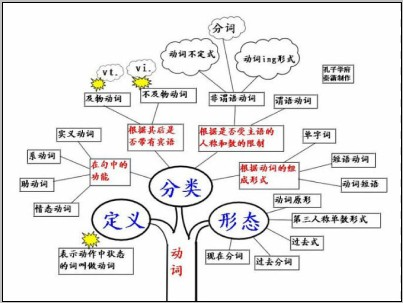
虚拟语气的概念:
虚拟语气用来表示说话人的主观愿望或假想,所说的是一个条件,不一定是事实,或与事实相反。在条件句中的应用条件句可分为两类,一类为真实条件句,一类为非真实条件句。非真实条件句表示的是假设的或实际可能性不大的情况,故采用虚拟语气。
虚拟语气在条件句中的应用:
一、真实条件句:
真实条件句真实条件句用于陈述语气,假设的情况可能发生,其中if是如果的意思。
时态关系句型:条件从句:一般现在时;主句:shall/will+动词原形
如:If he comes, he will bring his violin.
典型例题:
The volleyball match will be put off if it___.
A. will rain
B. rains
C. rained
D. is rained
答案:B。真实条件句主句为将来时,从句用一般现在时。
注意:1)在真实条件句中,主句不能用be going to表示将来,该用shall, will。
如: (错) If you leave now, you are never going to regret it.
(对) If you leave now, you will never regret it.
2)表示真理时,主句谓语动词便不用shall(will)+动词原形,而直接用一般现在时的动词形式。
二、非真实条件句:
非真实条件句表示的是假设的或实际可能性不大的情况,故采用虚拟语气。
1)时态:可以表示过去,现在和将来的情况。它的基本特点是时态退后。
a. 同现在事实相反的假设。
句型:从句:一般过去时;主句:should(would)+动词原形
如:If they were here, they would help you.
b.表示于过去事实相反的假设。
句型:条件从句:过去完成时;主句:should(would)have+过去分词
如:If she had worked harder, she would have succeeded.
The rice would not have been burnt if you had been more careful.
If my lawyer had been here last Saturday, he would have prevented me from going.
c.表示对将来的假想句型:
条件从句:一般过去时;主句:should+动词原形
从句: were+不定式;主句:would+动词原形 should+动词原形
如:If you succeeded, everything would be all right.
If you should succeed, everything would be all right.
If you were to succeed, everything would be all right.
三、混合条件句:
主句与从句的动作发生在不同的时间,这时主,从句谓语动词的虚拟语气形式因时间不同而不同,这叫做混合条件句。
如:If you had asked him yesterday, you would know what to do now. (从句与过去事实相反,主句与现在事实相反。)
If it had rained last night (过去), it would be very cold today (现在).
比较if only与only if:
only if表示“只有”;if only则表示“如果……就好了”。If only也可用于陈述语气。
如:I wake up only if the alarm clock rings. 只有闹钟响了,我才会醒。
If only the alarm clock had rung. 当时闹钟响了,就好了。
If only he comes early. 但愿他早点回来。
It is(high) time that It is(high) time that 后面的从句谓语动词要用过去式或用should加动词原形,但should不可省略。
如:It is time that the children went to bed.
It is high time that the children should go to bed.
need“不必做”和“本不该做"”
didn't need to do表示:过去不必做某事,事实上也没做。
needn'thavedone表示:过去不必做某事,但事实上做了。
如:John went to the station with the car to meet Mary, so she didn't need to walk back home.
约翰开车去车站接玛丽,所以她不必步行回家了。
John went to the station with the car to meet Mary, so she needn't have walked back home.
约翰开车去车站接玛丽,所以她本不必步行回家了。(Mary步行回家,没有遇上John的车。)
典型例题:
There was plenty o ftime. She___.
A. mustn't have hurried
B. couldn't have hurried
C. must not hurry
D. needn't have hurried
答案:D。needn't havedone. 意为"本不必",即已经做了某事,而时实际上不必要。 Mustn't have done用法不正确,对过去发生的事情进行否定性推断应为couldn't have done,“不可能已经”。must not do不可以(用于一般现在时)
特殊的虚拟语气词should 的用法:
1)It is demanded/necessary/a pity+that…结构中的主语从句的谓语动词要用should加动词原形,should可省略。
句型:
如:It is suggested that we(should) hold a meeting next week.
It is necessary that he(should) come to our meeting tomorrow.
2)在宾语从句中的应用在表示命令、建议、要求等一类动词后面的从句中。order, suggest, propose, require, demand, request, insist, command, insist+(should)do
如:I suggest that we(should) hold a meeting next week.
He insisted that he(should) be sent there.
注意:如suggest, insist不表示“建议”或“坚持要某人做某事时”,即它们用于其本意“暗示、表明”、“坚持认为”时,宾语从句用陈述语气。
如:The guard at gate insisted that everybody obey the rules.
判断改错:(错)You pale face suggests that you(should) be ill.
(对)Your pale face suggests that you are ill.
(错)I insisted that you(should) be wrong.
(对)I insisted that you were wrong.
3)在表语从句,同位语从句中的应用在suggestion, proposal, idea, plan, order, advice等名词后面的表语从句、同位语从句中要用虚拟语气,即(should)+动词原形。
如:My idea is that we(should) get more people to attend the conference.
I make a proposal that we(should) hold a meeting next week.
虚拟语气知识体系:
| 条件从句中的谓语动词形式 | 主句中的谓语动词形式 | |
| 与过去事实相反 | had+过去分词 | should/would+have+过去分词 |
| 与现在事实相反 | 过去式 | should/would+动词原形 |
| 与将来事实相反 | 1、过去式 | should/would+动词原形 |
| 2、should+动词原形 | should/would+动词原形 | |
| 3、were to+动词原形 | should/would+动词原形 |
虚拟条件句的倒装:
虚拟条件句的从句部分如果含有were, should, 或had, 可将if省略,再把were, should或had移到从句句首,实行倒装。
如:Were they here now, they could help us.=If they were here now, they could help us.
Had you come earlier, you would have met him=If you had come earlier, you would have met him.
Should it rain, the crops would be saved.=Were it to rain, the crops would be saved.
注意:在虚拟语气的从句中,动词“be”的过去时态一律用“were”,不用was,即在从句中be用were代替。
如:If I were you, I would go to look for him. 如果我是你,就会去找他。
If he were here, everything would be all right. 如果他在这儿,一切都会好的。
典型例题:_____to do the work, I should do it some other day.
A. If were I
B. I were
C. Were I
D. Was I
答案:C. 在虚拟条件状语中如果有were, should, had这三个词,通常将if省略,主语提前,变成were, should, had+主语的形式。
但要注意,在虚拟条件状语从句中,省略连词的倒装形式的句首不能用动词的缩略形式。如我们可说Were I not to do.,而不能说Weren't I to do。
与“短文改错下面短文中有10处语法错误。请在有错误的地方增加、...”考查相似的试题有:
- You are___ to meet many difficulties when you are seeking success.A.eagerB.anxiousC.interestedD.bound
- 65. They are living in a place and their houses are flooded almost once every year.A.lie-lowB.low-lieC.low-lainD....
- Language belongs to each one of us,to the flower-seller to the professor.A.as much asB.as well asC.as far asD.a...
- They always lay a large supply of tinned food in winter in case they are snowed up.A.outB.offC.inD.with
- I can him to you for the job. He is a very good worker.[ ]A. suggestB. recommendC. adviseD. prompt
- As a student, you should try to ______ being late for your class.A.avoidB.refuseC.preventD.punish
- Friendship among the nations will _______the economic development of the region.A.devote toB.contribute toC.attend...
- He is diligent and wise and deserves to_______.A succeed B. success C. successful D. successfully
- It is you who make this foolish mistake ,but you want to _______the blame _______me, It’s unfairA put, on B lay, for ...
- It is required that under no circumstances ______ betray ourselves even if there are temptationslike money or beauty....